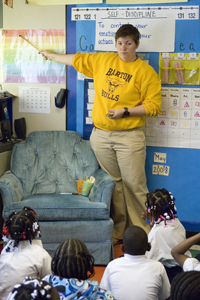Teacher training program graduates to high school
By William Harmsw-harms@uchicago.edu
News Office
 Eliza Bryant, a UTEP graduate, now teaches at Clara Barton Elementary School on Chicagoís South Side. |
|
Responding to a national shortage of high school mathematics and science teachers, the Urban Education Institute will expand its teacher preparation program in 2009 to ready secondary math and biology teachers for urban classrooms.
The Urban Teacher Education Program at the institute will admit its first class of prospective high school teachers into its master’s degree program in spring 2009.
John Boyer, Dean of the College, announced the new high school program at a recent celebration that marked the fifth anniversary of the launch of the Urban Teacher Education Program. Boyer said the commitment to prepare high school teachers brings the University full circle to its early days, when a considerable number of its graduates went into elementary and secondary teaching.
“The University recognizes that a central part of its mission as an institution of higher learning in Chicago is to help train educators at all levels,” Boyer said.
Current students or graduates of the College with concentrations in mathematics, biology or their equivalents will be admitted into the first secondary teacher training class. Until now, the program prepared only elementary school teachers.
“Training the next generation of secondary mathematics and science teachers is not just the right thing to do, it is essential to the improvement of urban schooling,” said Timothy Knowles, the Lewis-Sebring Director of the Urban Education Institute. “We are thrilled to initiate this work with the College and distinguished faculty from biology and mathematics.”
The Urban Education Institute combines the intellectual resources of the University with the expertise of education practitioners who work daily with children and teachers; their goal is to add new knowledge to better inform the nation how to produce excellent urban schools in America. The collaborative effort between UTEP and the University biology and mathematics faculty represents UEI’s unique approach to the problems facing urban education.
“There has been intense interest in secondary school teaching among some of our students in biology, and many of them have gone on to Teach for America, for instance. Now they can pursue a teacher certification program on campus,” said Michael LaBarbera, Professor in Organismal Biology & Anatomy. He helped design the secondary teaching program for undergraduates pursuing degrees in biology.
“We want to offer a high-quality program so that our graduates can be exceptional high school teachers,” LaBarbera said.
Paul Sally, Professor in Mathematics, said the mathematics program would be available to students who major or minor in Mathematics. “We may have students in Economics or Physics enrolled in the program. However, we want them all to be well grounded in content.
“The important thing is that our students really understand the material so they can offer their students at least three different ways to solve a problem,” he said.
Prospective UTEP students may obtain more information or apply online by April 18, 2009 at http://utep.uchicago.edu/apply/application.shtml. An informational meeting will be held at noon Jan. 23, 2009 in the Reynolds Club.
One of the appealing aspects of UTEP is that University undergraduates may apply for the program and complete the first year of the two-year master’s program as seniors. Upon successful completion of the program, students receive a Master of Arts in Teaching from the University’s Graham School of General Studies and are licensed to teach in Illinois classrooms.
While the initial eight to 10 secondary candidates in both mathematics and biology will be University students or graduates, Kavita Kapadia, Director of UTEP, said she expects the program to admit students from other quality universities.
“We expect it to mirror UTEP’s elementary program in fundamental ways, not only in key design features, but also in its expansion plans,” Kapadia said.
![[Chronicle]](/images/sidebar_header_oct06.gif)